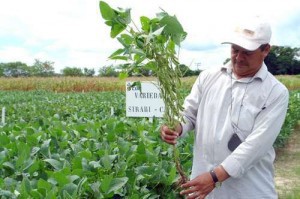Yesterday, the Second Chamber of the Supreme Court of Justice of the Nation (SCJN) overturned permits issued to the transnational Monsanto by the General Department of Plant Health at the National Service for Food Health, Safety and Quality (SENASICA) [under Secretariat of Agriculture, Livestock, Rural Development, Fisheries and Food, SAGARPA] for production of transgenic soya.
The Court ordered authorities to hold a “prior, free and informed” consultation with the indigenous communities of Yucatán and Campeche, before granting new authorization.
Without going into the issue of the negative impact of planting GM soybeans*, the justices ordered authorities to listen to the communities, as established by the Constitution and international treaties signed by Mexico, when a project may affect indigenous peoples.
Honey producers, led by Angélica María Ek Canché, filed petitions for amparo [legal protection, similar to injunction] against Monsanto and SENASICA on the grounds that the SAGARPA had violated their right, enshrined in the Article 2 of the Constitution, to be consulted.
In their petition, they asked the Supreme Court to order the federal authorities to stop the planting on 253,500 hectares in five areas located on the Yucatán Peninsula, in Chiapas and on the Huasteca Plain. The relevant permits were issued on May 11, 2012.
The indigenous peoples have the right to be consulted in cases where administrative acts, development programmes, projects or activities may affect their life and environment in a significant manner, the justices said. This right, they stressed, must be implemented when it is determined that the activity of the State might create a significant impact on communities.
They explained that the consultation procedures must be prior and must conform to indigenous traditions, languages and culture through objective data that enable them to make informed choices in an atmosphere free of hostilities, as established by precedents laid down by the full Supreme Court and in International Labour Organization (ILO) Convention 169.
The Second Chamber concluded that the authorities violated the plaintiff’s right to be consulted, which invalidated the permits in municipalities of the states of Yucatán and Campeche in which the affected communities are located. That is, until the National Commission for the Development of Indigenous Peoples and the Intersecretarial Commission on the Biosafety of Genetically Modified Organisms have conducted a consultation.
Historic Decision
The Mexican Centre for Environmental Law considered this decision to be a historic achievement both for the Maya people and for building a multicultural rule of law in Mexico.
This decision and other earlier rulings “show the way to a change in the law and public policy of the Mexican state, where the right to consultation must be guaranteed in any legislative or administrative measure that might directly affect the peoples and communities.”
Hence, the consultation must be the mechanism that enables building bridges for dialogue in a culturally diverse society.
*Proceso: “The Maya assert that this activity impacts the environment in the region; specifically, contaminating the water supply and causing deforestation; but above all, because the presence of GM soybean damages their main source of income: beekeeping [especially sales of organic honey to the European market, which has a ban on all products containing GMOs; bees feeding on pollen contaminated with GMOs produce honey that also shows traces of GMOs].”
by Jesús Aranda / La Jornada
http://www.jornada.unam.mx/2015/11/05/sociedad/039n1soc?partner=rss
